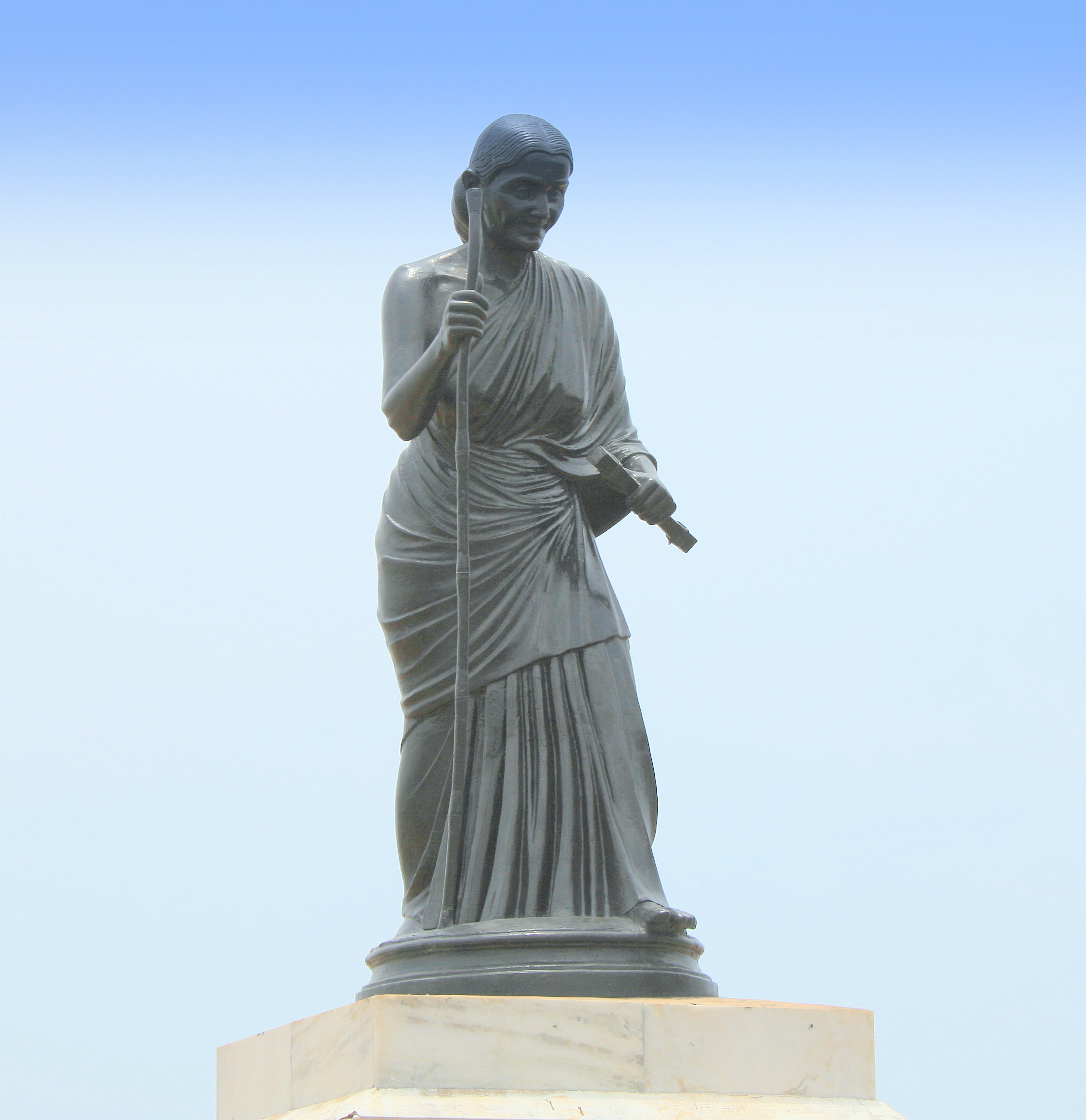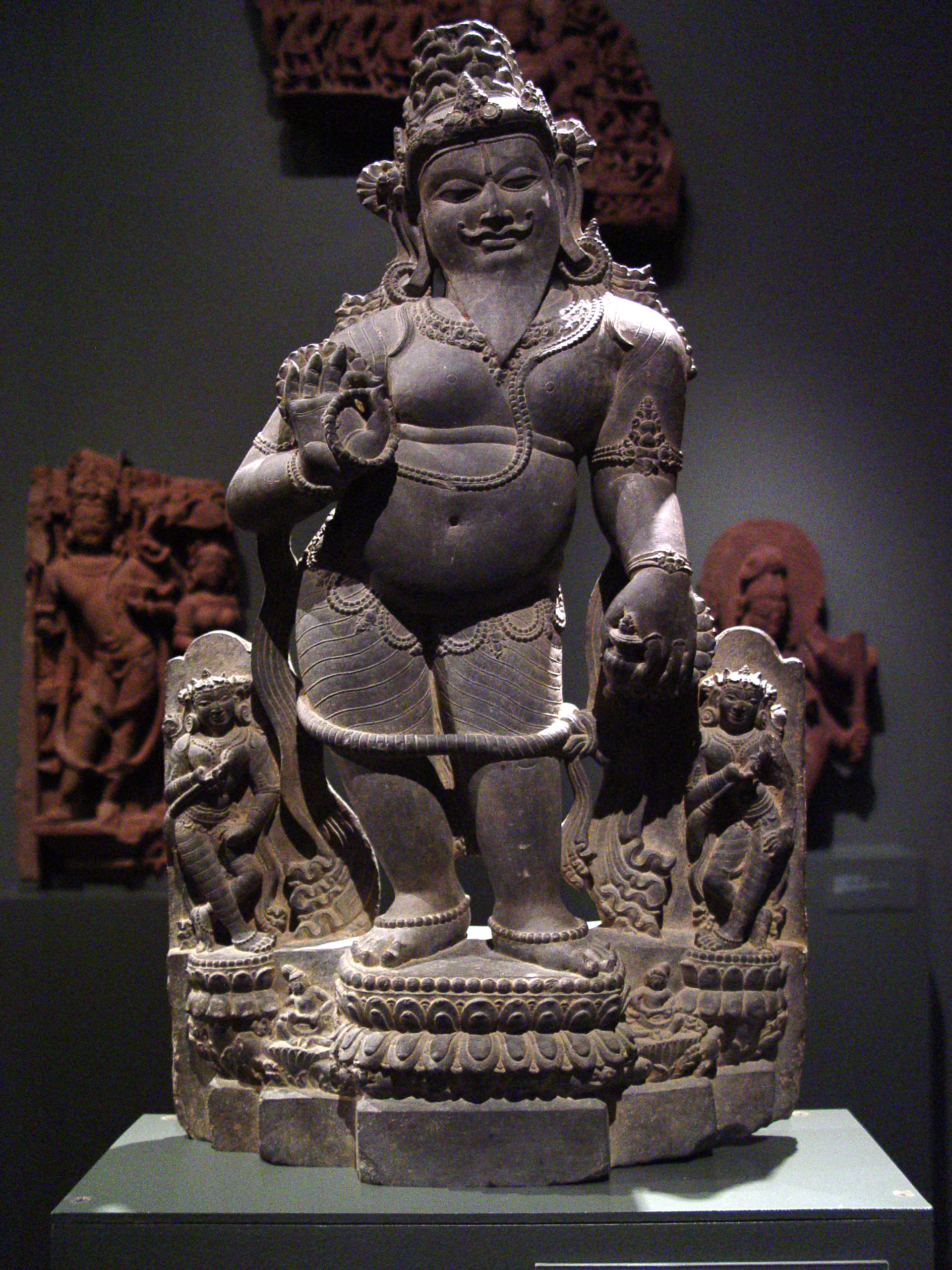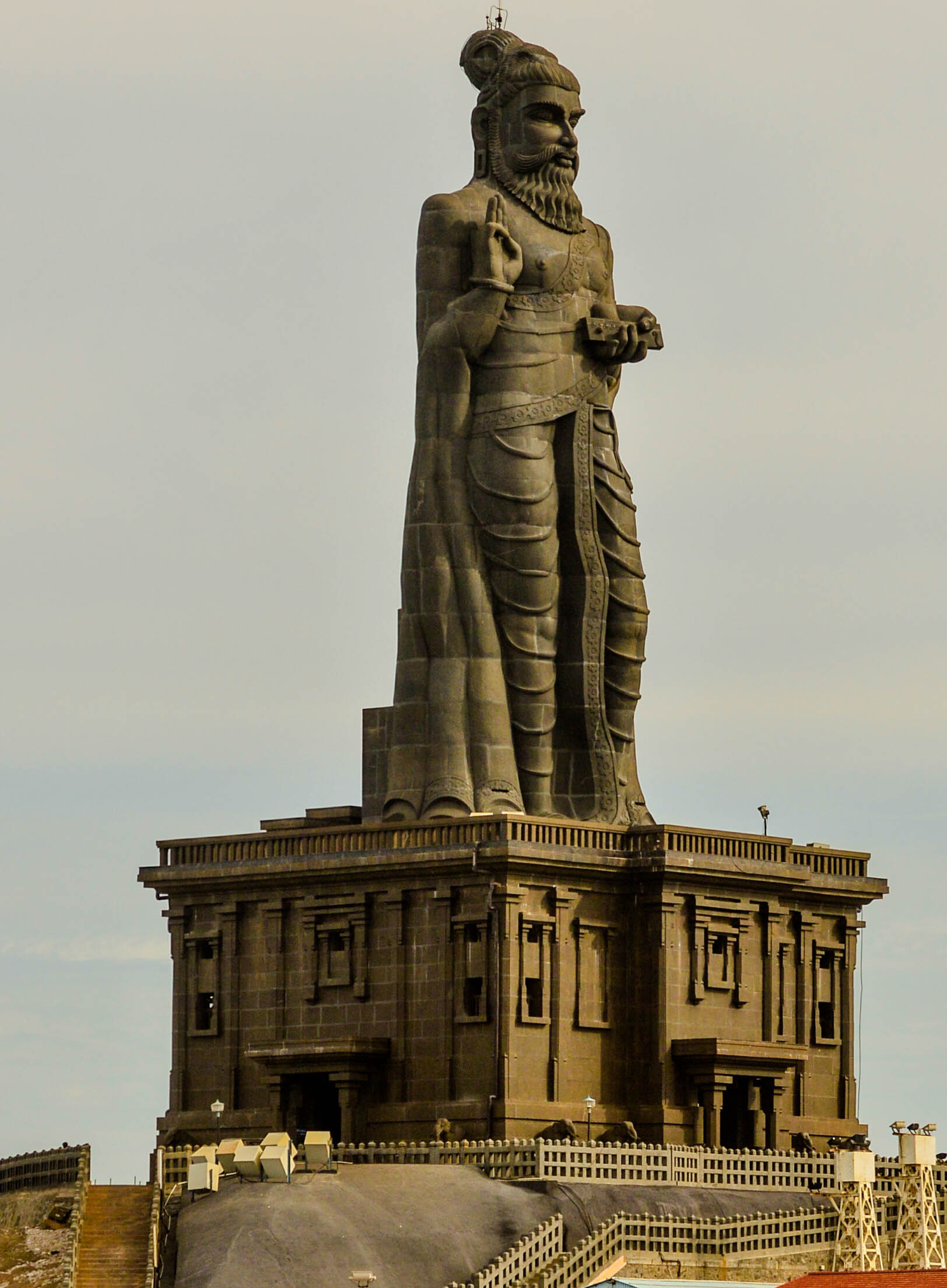|
Idaikkadar
Idaikaadar (Tamil: இடைக்காடர்) was a Tamil siddhar of the Sangam period. He authored verse 54 of the Tiruvalluva Maalai. Biography Unlike Idaikaadanar of the Sangam period, who was a poet by profession, Idaikaadar was a siddhar. Idaikaadar hailed from Idaikattur near Madurai. He belongs to the Idaikkali country. He is known for composing poems with excellent exemplifications. He has written in praise of the Chola King Kulamuttratthu Thunjiya Killi Valavan (Purananuru verse 42). He has also authored the grammar text "Oosimuri". He is believed to have attained jeeva samadhi at Thiruvannamalai. He hosted navagrahas during a famine. A small navagraha temple remains at the site today at Idaikattur. Literary contributions Verse 54 of the Tiruvalluva Maalai, an encomium written on Valluvar and the Kural literature, is attributed to Idaikaadar. The verse suggests, "Valluvar pierced a mustard and injected seven seas into it and compressed it into what we have tod ... [...More Info...] [...Related Items...] OR: [Wikipedia] [Google] [Baidu] |
Tiruvalluva Maalai
Tiruvalluva Maalai (Tamil: திருவள்ளுவ மாலை), literally 'Garland of Valluvar', is an anthology of ancient Tamil paeans containing fifty-five verses each attributed to different poets praising the ancient work of the Kural and its author Valluvar. With the poets' time spanning across centuries starting from around 1st century CE, the collection is believed to have reached its present form by 10th century CE. With the historical details of the ancient philosopher and his work remaining obscure, much of the legend on the Kural and Valluvar as they are known today are chiefly from this work. The collection also reveals the name of the author of the Kural text as 'Valluvar' for the first time, as Valluvar himself composed the Kural text centuries earlier without indicating his name anywhere in his work. Reminiscing this, E. S. Ariel, a French scholar of the 19th century, famously said of the Tirukkural thus: ''Ce livre sans nom, par un autre sans nom'' ("Th ... [...More Info...] [...Related Items...] OR: [Wikipedia] [Google] [Baidu] |
Siddhar
The Siddhar (Tamil: சித்தர் ''cittar'', from Sanskrit: ''siddha'') in Tamils, Tamil tradition is a perfected individual, who has attained spiritual powers called ''siddhi''. Historically, Siddhar also refers to the people who were early age wandering adepts that dominated ancient Tamil teaching and philosophy. They were knowledgeable in science, technology, astronomy, literature, fine arts, music, drama, dance, and provided solutions to common people in their illness and advice for their future. Some of their ideologies are considered to have originated during the First Sangam period. Practice Siddhars were typically first scientists, saints, doctors, alchemists, and mystics all in one. They wrote their findings in the form of Tamil language, Tamil poems on Palm-leaf manuscript, palm leaf manuscripts. These are still owned by some families in Tamil Nadu and handed down through the generations, as well as being kept in universities in India, Germany, Great Brita ... [...More Info...] [...Related Items...] OR: [Wikipedia] [Google] [Baidu] |
Avvaiyar I
Avvaiyar (Tamil: ஔவையார்) was the title of more than one female poet who were active during different periods of Tamil literature. They were some of the most famous and important female poets of the Tamil canon. Abidhana Chintamani states that there were three female poets titled ''Avvaiyar''. Among them, the first Avvaiyar lived during the Sangam period (c. 3rd century BCE) and is said to have had cordial relations with the Tamil chieftains Vēl Pāri and Athiyamān. She wrote 59 poems in the Puṟanāṉūṟu. Avvaiyar II lived during the period of Kambar and Ottakoothar during the reign of the Chola dynasty in the tenth century. She is often imagined as an old and intelligent lady by Tamil people. Many poems and the Avvai Kural, comprising 310 kurals in 31 chapters, belong to this period. The third Avvaiyar is the most widely known for her 'Vinayagar Agaval', 'Aathichoodi', 'Kondrai Vendhan', ' Nalvazhi' and ' Moodhurai'. Name etymology The name Avvaiyar ... [...More Info...] [...Related Items...] OR: [Wikipedia] [Google] [Baidu] |
Tamil Language
Tamil (; ' , ) is a Dravidian language natively spoken by the Tamil people of South Asia. Tamil is an official language of the Indian state of Tamil Nadu, the sovereign nations of Sri Lanka and Singapore, and the Indian territory of Puducherry. Tamil is also spoken by significant minorities in the four other South Indian states of Kerala, Karnataka, Andhra Pradesh and Telangana, and the Union Territory of the Andaman and Nicobar Islands. It is also spoken by the Tamil diaspora found in many countries, including Malaysia, Myanmar, South Africa, United Kingdom, United States, Canada, Australia and Mauritius. Tamil is also natively spoken by Sri Lankan Moors. One of 22 scheduled languages in the Constitution of India, Tamil was the first to be classified as a classical language of India. Tamil is one of the longest-surviving classical languages of India.. "Tamil is one of the two longest-surviving classical languages in India" (p. 7). A. K. Ramanujan described it as "the on ... [...More Info...] [...Related Items...] OR: [Wikipedia] [Google] [Baidu] |
Valluvar
Thiruvalluvar (Tamil language, Tamil: திருவள்ளுவர்), commonly known as Valluvar, was a celebrated Tamil people, Tamil poet and philosopher. He is best known as the author of the ''Tirukkuṟaḷ'', a collection of couplets on ethics, political and economical matters, and love. The text is considered an exceptional and widely cherished work of Tamil literature. Almost no authentic information is available about Valluvar, states Kamil Zvelebil – a scholar of Tamil literature. His life and likely background are variously inferred from his literary works by different biographers. There are unauthentic hagiographic and legendary accounts of Valluvar's life, and all major Indian religions, as well as Christian missionaries of the 19th century, have tried to claim him as secretly inspired (''crypto-'') or originally belonging to their tradition. Little is known with certainty about his family background, religious affiliation, or birthplace. He is believed t ... [...More Info...] [...Related Items...] OR: [Wikipedia] [Google] [Baidu] |
Year Of Birth Missing
A year or annus is the orbital period of a planetary body, for example, the Earth, moving in its orbit around the Sun. Due to the Earth's axial tilt, the course of a year sees the passing of the seasons, marked by change in weather, the hours of daylight, and, consequently, vegetation and soil fertility. In temperate and subpolar regions around the planet, four seasons are generally recognized: spring, summer, autumn and winter. In tropical and subtropical regions, several geographical sectors do not present defined seasons; but in the seasonal tropics, the annual wet and dry seasons are recognized and tracked. A calendar year is an approximation of the number of days of the Earth's orbital period, as counted in a given calendar. The Gregorian calendar, or modern calendar, presents its calendar year to be either a common year of 365 days or a leap year of 366 days, as do the Julian calendars. For the Gregorian calendar, the average length of the calendar year (the mea ... [...More Info...] [...Related Items...] OR: [Wikipedia] [Google] [Baidu] |
List Of Sangam Poets
Sangam refers to the assembly of the highly learned people of the ancient Tamil land, with the primary aim of advancing the literature. There were historically three Sangams. With the details of the first two Sangams remaining obscure, all the available Sangam works come from the Third Sangam, which began sometime around 1500 BCE. It is said to have lasted 1850 years, until around 300 CE, with 449 poets contributing under the patronage of 49 Pandyan kings. However, only the works of the last 800 years of the Sangam period () have been retrieved and others are believed to have been lost. List of Sangam poets Below is a list of poets of the Third Sangam period: See also * Third Sangam * Sangam landscape The Sangam landscape (Tamil: அகத்திணை "inner classification") is the name given to a poetic device that was characteristic of love poetry in classical Tamil Sangam literature. The core of the device was the categorisation of poe ... References Further r ... [...More Info...] [...Related Items...] OR: [Wikipedia] [Google] [Baidu] |
Sangam Literature
The Sangam literature (Tamil: சங்க இலக்கியம், ''caṅka ilakkiyam'';) historically known as 'the poetry of the noble ones' (Tamil: சான்றோர் செய்யுள், ''Cāṉṟōr ceyyuḷ'') connotes the ancient Tamil literature and is the earliest known literature of South India. The Tamil tradition and legends link it to three literary gatherings around Madurai and Kapāṭapuram ( Pandyan capitals): the first over 4,440 years, the second over 3,700 years, and the third over 1,850 years before the start of the common era. Scholars consider this Tamil tradition-based chronology as ahistorical and mythical. Most scholars suggest the historical Sangam literature era spanned from c. 300 BCE to 300 CE, while others variously place this early classical Tamil literature period a bit later and more narrowly but all before 300 CE. According to Kamil Zvelebil – a Tamil literature and history scholar, the most acceptable range for the Sangam l ... [...More Info...] [...Related Items...] OR: [Wikipedia] [Google] [Baidu] |
Kural Text
The ''Tirukkuṟaḷ'' ( ta, திருக்குறள், lit=sacred verses), or shortly the ''Kural'' ( ta, குறள்), is a classic Tamil language text consisting of 1,330 short couplets, or kurals, of seven words each. The text is divided into three books with aphoristic teachings on virtue (''aram''), wealth (''porul'') and love (''inbam''), respectively. Considered one of the greatest works ever written on ethics and morality, it is known for its universality and secular nature. Its authorship is traditionally attributed to Valluvar, also known in full as Thiruvalluvar. The text has been dated variously from 300 BCE to 5th century CE. The traditional accounts describe it as the last work of the third Sangam, but linguistic analysis suggests a later date of 450 to 500 CE and that it was composed after the Sangam period. The Kural text is among the earliest systems of Indian epistemology and metaphysics. The Kural is traditionally praised with epithets and alte ... [...More Info...] [...Related Items...] OR: [Wikipedia] [Google] [Baidu] |
Kural Venba
The Kural is one of the most important forms of classical Tamil language poetry. It is a very short poetic form being an independent couplet complete in 2 lines, the first line consisting of 4 words and the second line consisting of 3. As one of the five types of Venpa stanza, it must also conform to the grammar for Venpa, the most difficult and the most highly esteemed of stanzaic structures in classical Tamil literature. The ''Tirukkuṛaḷ'' by Tiruvalluvar, one of the greatest philosophical works in Tamil, is a typical example. Structure Prosodic background The Tamil conception of metrical structure includes elements that appear in no other major prosodic system. This discussion is presented in terms of syllables, feet, and lines (although syllables are not explicitly present in Tamil prosodic theory). Similarly to classical Latin, Greek, and Sanskrit prosody, a syllable is long if its vowel is (1) long (including diphthongs) or (2) followed by two or more consonants. Gene ... [...More Info...] [...Related Items...] OR: [Wikipedia] [Google] [Baidu] |
Tirukkural
The ''Tirukkuṟaḷ'' ( ta, திருக்குறள், lit=sacred verses), or shortly the ''Kural'' ( ta, குறள்), is a classic Tamil language text consisting of 1,330 short couplets, or Kural (poetic form), kurals, of seven words each. The text is divided into three books with aphoristic teachings on virtue (''aram''), wealth (''porul'') and love (''inbam''), respectively. Considered one of the greatest works ever written on ethics and morality, it is known for its universality and secularity, secular nature. Its authorship is traditionally attributed to Thiruvalluvar, Valluvar, also known in full as Thiruvalluvar. The text has been dated variously from 300 BCE to 5th century CE. The traditional accounts describe it as the last work of the third Sangam literature, Sangam, but linguistic analysis suggests a later date of 450 to 500 CE and that it was composed after the Sangam period. The Kural text is among the earliest systems of Indian epistemology and meta ... [...More Info...] [...Related Items...] OR: [Wikipedia] [Google] [Baidu] |








